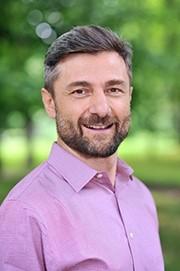A new study lead by Weill Department of Medicine and NewYork-Presbyterian investigators finds that certain gut-dwelling fungi flourish in severe cases of COVID-19, amplifying the excessive inflammation that drives the disease while also causing long-term immune system changes. This discovery also identifies a group of patients who may benefit from specialized, but yet-to-be determined treatments.

Dr. Illiyan Illiev
The research reveals a new dimension of the complex pathology unleashed by severe COVID-19, according to senior author Dr. Iliyan Iliev, an associate professor of immunology in medicine in the Department of Medicine, co-director of the Microbiome Core Lab and a member of the Jill Roberts Institute for Research in Inflammatory Bowel Disease at Weill Cornell Medicine.
Utilizing patient samples and preclinical models, the research team determined that the growth of fungi in the intestinal tract, particularly strains of Candida albicans yeast, trigger an upsurge in immune cells whose actions can exacerbate lung damage. Their findings, published in Nature Immunology on Oct. 23, also elucidate that patients retain a heightened immune response and immune memory against these fungi for up to a year after the resolution of SARS-CoV-2 infection.
“Severe and long COVID-19 were not thought to involve fungal blooms in the intestines that, in addition to the virus, can impact patient’s immunity,” he said.
Dr. Iliev, an immunologist who studies the microbiome and the chronic inflammatory conditions targeting the gastrointestinal tract, pivoted to COVID-19 during the pandemic. As researchers gained a better handle on the new viral infections, it became clear that, in COVID-19 as in inflammatory bowel disease, the body’s own inflammatory immune response causes harm.
To investigate this errant immune response, Dr. Iliev and Dr. Takato Kusakabe, a postdoctoral fellow and a first author in the study, worked with numerous colleagues to acquire three large clinical cohorts of COVID-19 patients and develop a mouse model to study the disease. They collaborated with members of the Weill Department of Medicine and the Department of Pathology and Laboratory Medicine at Weill Cornell Medicine, including Dr. Stephen Josefowitz, Dr. Mirella Salvatore, Dr. Melissa Cushing, Dr. Lars Westblade, and Dr. Adolfo García-Sastre, a professor of microbiology and director of the Global Health and Emerging Pathogens Institute of the Icahn School of Medicine at Mount Sinai.
Learn more in Weill Cornell Medicine's newsroom story.
Related Link: Dr. Illev Lab

